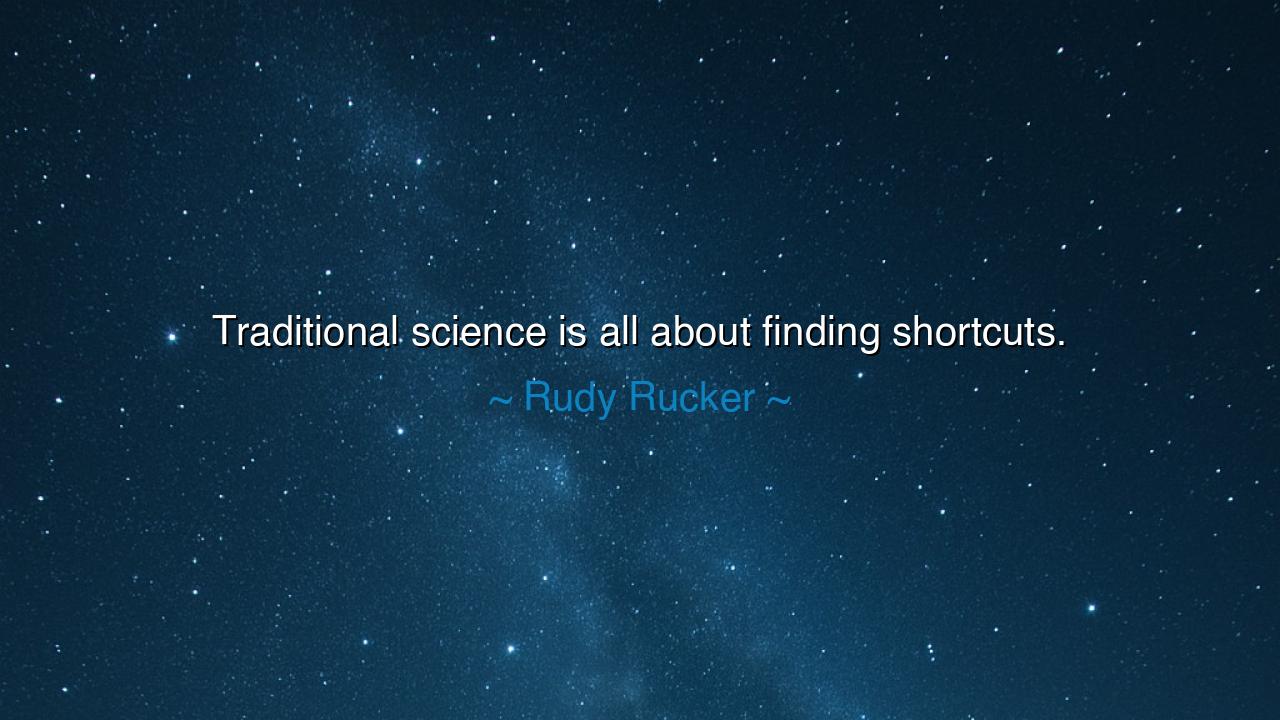
Traditional science is all about finding shortcuts.






"Traditional science is all about finding shortcuts." These words from Rudy Rucker challenge the conventional notion of science as a linear, methodical pursuit of knowledge. Rucker's assertion that science is essentially about finding shortcuts may seem counterintuitive at first. After all, we are taught to think of science as a discipline grounded in rigorous method, systematic observation, and careful, detailed study. Yet, Rucker's words remind us of the deeper wisdom of science: it is not about getting lost in endless complexity, but rather about seeking the most elegant, the most efficient, and the most insightful solutions to the questions that plague us. It is about finding paths to truth that are shorter, more direct, and more profound.
In the ancient world, science was often not viewed as a singular discipline, but as a quest for wisdom and understanding. Pythagoras, the great Greek mathematician, did not merely search for numbers; he searched for the simplest truths that could explain the vastness of the cosmos. He sought the harmonies in music and geometry, finding that the most profound truths were often hidden in the most simple of forms. Similarly, Archimedes, another luminary of ancient thought, sought shortcuts in his work—whether he was discovering the principle of buoyancy or solving the problem of the gold crown. His famous exclamation, “Eureka!”, came when he realized that he had found a simple and elegant solution to a complex problem. For Archimedes and Pythagoras, the pursuit of science was not about accumulating endless detail, but about uncovering the fundamental truths in the simplest, most direct way.
This ancient pursuit of simplicity in the face of complexity is still at the heart of modern science. When Isaac Newton developed the laws of motion and gravity, he did not create complex and convoluted systems. Instead, he found a set of simple, universal principles that could explain the movements of the heavens and the fall of an apple. Newton sought to uncover shortcuts—efficient paths to understanding the laws that govern the natural world. Through his work, he distilled the universe into its essential components, making it possible for future generations to build on his insights. Just as Pythagoras and Archimedes sought simplicity, so did Newton, showing that the greatest achievements of science often come when we seek the simplest explanation, the most elegant solution to a complex problem.
Rucker's view on science also speaks to the way science evolves through the process of abstraction and simplification. Over time, the pursuit of understanding leads to the discovery of general principles that apply across multiple domains. Consider Albert Einstein and his theory of relativity. Einstein’s genius was not just in finding new ways to explain gravity, but in realizing that space and time were not separate entities but intertwined, part of a unified structure that simplified our understanding of the universe. By finding the most fundamental shortcut—that space-time is curved and dynamic—Einstein opened up entirely new realms of thought in physics. His work did not require endless experimentation; instead, it was built upon the simplicity of a few fundamental truths, showing that even the most complex phenomena could be explained through simple, abstract principles.
In science, then, shortcuts are not a matter of cutting corners, but of finding the simplest path to understanding. Rucker's statement invites us to see science as a journey of discovering those profound truths that, once understood, reveal the beauty of the universe in the most elegant ways. Each breakthrough, whether it is Newton discovering the laws of motion, Einstein unifying gravity with the fabric of space, or Marie Curie unveiling the mysteries of radioactivity, is a journey toward a simplified understanding of the natural world. These shortcuts are the moments of insight that allow us to step back and see the underlying order and simplicity within the chaos of nature.
The lesson here is not that science is about bypassing the difficult work or avoiding the complexities of understanding, but about the importance of seeking elegance in the face of complexity. Just as the ancients sought the most basic truths through observation, reason, and simplicity, we too must approach science with the awareness that the most profound truths often lie in the most direct and simple explanations. Rucker calls us to embrace this ideal, to look for those shortcuts that can illuminate vast swaths of knowledge with a single, clear insight.
In your own life, whether you are a scientist, an artist, or someone navigating the complexities of daily existence, remember that the pursuit of truth is not about accumulating endless facts, but about seeking the simplest, most powerful solutions. Just as Pythagoras, Newton, and Einstein sought the elegant simplicity that lies beneath complexity, so too must we. In everything you do, aim not to add layers of unnecessary complication, but to strip away the extraneous and find the essence of the matter at hand. This is the true path of wisdom: not in complexity, but in the simplicity of insight and the power of elegance.






AAdministratorAdministrator
Welcome, honored guests. Please leave a comment, we will respond soon